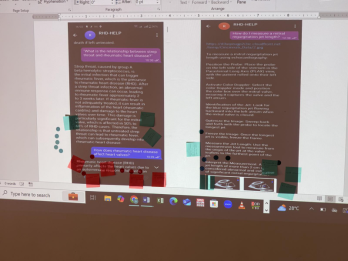RRCU is Exploring How a WhatsApp-based AI Tool Could Simplify and Streamline Training for Echocardiography-based RHD Screening in Low-Resource Settings
Imagine a world where a primary healthcare nurse in rural Uganda can receive personalized, just-in-time medical training through a simple WhatsApp chat. This groundbreaking research project is exploring the feasibility of this model. The study aims to determine whether artificial intelligence can support the dramatic scale-up of critically important training for RHD screening echocardiography in resource-limited settings, potentially transforming how we approach capacity building at the local level.
The need is urgent. Rheumatic heart disease (RHD) affects over 55 million people worldwide and is a leading cause of mortality from acquired heart disease in young people globally. In Uganda, only 1-2% of estimated RHD cases are diagnosed, and 85% of those diagnosed already have severe disease. Without early detection and treatment, 1 in 5 Ugandans with RHD die within one year of diagnosis.
It is imperative that we find more RHD and find it early. Echocardiography is the most effective tool for this goal, and studies show that when echocardiography is conducted by frontline primary health care workers rather than at larger health centers, more people can receive this screening test. However, to conduct these screenings, health care workers need practical, effective, and timely training that can be delivered at scale.
What makes this project unique is its use of a large language model (LLM)-powered WhatsApp chatbot to deliver personalized echocardiography training to nurses who have never performed heart echocardiograms before. The use of the LLM chatbot could save highly skilled trainers dozens of hours working with new trainees and could vastly expand access to the training overall.
If successful, this approach could shift the current training landscape from in-person and resource-intensive to, scalable, remote, AI-powered learning, providing access to advanced medical training globally.
These screenshots demonstrate the chat features of the tool, where the trainees and providers can ask questions and receive immediate and informative responses
Project Overview and Aims
Project Timeline: 2024-2026
Funding: American Heart Association
This innovative research combines artificial intelligence, mobile technology, and community-centered participatory research to address a critical global health challenge. The project has three specific aims:
Aim 1 focuses on co-creating an LLM-based WhatsApp chatbot using human-centered design principles. Working directly with Ugandan nurses, researchers are ensuring the technology is culturally appropriate and meets real-world needs rather than imposing external solutions.
Aim 2 will compare learning outcomes between nurses trained with traditional methods versus those using the AI-enhanced approach.
Aim 3 examines real-world adoption barriers and facilitators, measuring acceptability, feasibility, appropriateness, and sustained engagement with the AI training system.
The Research Team
Dr. Hank Wirth leads this project as a postdoctoral fellow and recently appointed faculty in Pediatric Cardiology at Cincinnati Children's Hospital Medical Center. Dr. Wirth has spent three years working with the Rheumatic Heart Disease Research Collaborative in Uganda (RRCU), developing standardized nurse training programs and leading longitudinal studies of rheumatic fever patients.
"Our preliminary data shows that nurses can absolutely learn to screen for heart disease using ultrasound," notes Dr. Wirth. " The question is how we can make this training more efficient, personalized, and accessible at the scale needed to impact population health. We're testing whether AI can create learning experiences that adapt to each nurse's individual needs and challenges."
On the ground implementation support is provided by Dr. Doreen Nakagaayi, Adult Cardiologist at the Uganda Heart Institute and Investigator on the ADUNU Program, Mr. Jafes Pulle, MPH, Program Manager for the RRCU, and the Kitgum based team of Mr. Isaac Otim Omara, Mr. Ronald Ogwanh, Mr. Francis Odong, and Mrs. Evaline Aya. The project is conducted in partnership with the Uganda Heart Institute and District Health Office of Kitgum District, Northern Uganda, ensuring local ownership and sustainability. Technical development is supported by the REAN Foundation (https://www.reanfoundation.org/), an American Heart Association technology partner with expertise in healthcare AI applications.
The project operates under the larger ADUNU Program (NHLBI R01), a partnership focused on developing scalable models for decentralized RHD care across Uganda.
Current Progress and Preliminary Results
To help develop the chatbot-based trainings, Nurses participated in a workshop designed to refine the chatbot’s language and training approaches in ways that are reflective of the users’ needs.
The project has completed its initial human-centered design phase, working with 12 experienced nurses in Kitgum district to co-create the chatbot features and workflows. This phase used Community-Based Participatory Research methods to ensure the technology development was driven by end-user needs.
Through intensive design workshops, the team identified key training challenges and developed AI-powered solutions to address them.
Current achievements include:
· Development of a working WhatsApp bot prototype through several rounds of user-centered design workshops that utilized Community-Based Participatory Research methodology, ensuring the technology reflects the voices and needs of frontline healthcare workers
· Co-creation of locally informed AI training modules through design workshops with Ugandan nurses, resulting in content that addresses real-world challenges like patient positioning, equipment troubleshooting, and clinical decision-making
· Testing of the chatbot functionality across multiple nurse-centered workshops where participants evaluated the AI's ability to deliver personalized feedback, educational content, and quiz functionality
Next Steps and Future Impact
Immediate next steps involve field testing the application in the upcoming ADUNU expansion district, where over 40 new nurses will receive AI-enhanced training. Their training progression and outcomes will be compared to nurses previously trained without AI supplementation. Data collection will continue through 2026, measuring both learning outcomes and real-world implementation factors.
If successful, this research could:
· Improve Medical Education Delivery: Demonstrate whether AI can provide effective medical training while reducing the time, human, and financial resources required for traditional training approaches.
· Expand Access to Critical Diagnostic Testing: Support expansion of RHD screening programs across Uganda and other low- and middle-income countries.
Dr. Wirth envisions expansion beyond RHD: "The model we're developing—using AI to deliver personalized medical training through ubiquitous mobile platforms—could transform how we build healthcare capacity globally."
For patients, success would mean earlier detection of heart disease and timely treatment that prevents progression. For healthcare providers, it represents access to training that builds confidence and competency. For the global health community, this project offers insights into leveraging AI as a tool for expanding access to medical knowledge.
As healthcare systems worldwide face workforce shortages and training challenges, this research examines how thoughtfully designed AI might extend the reach of medical expertise to those who need it most.



